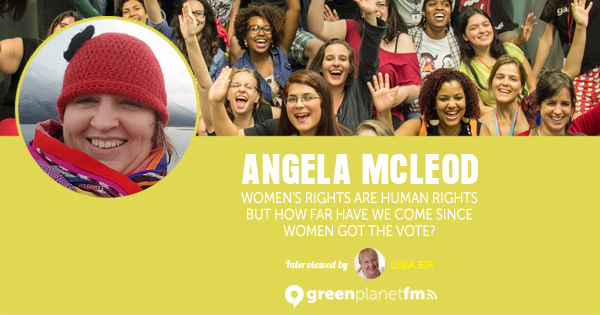
Kate Sheppard and her fellow suffragists gathered the signatures of nearly 32,000 women to demonstrate the groundswell of support for their cause. The
result of this was that the Electoral Act 1893 was passed by both houses of Parliament and became law on 19 September 1893.
New Zealand women gained
the right to stand for election in 1919. The first female MP, Elizabeth McCombs, was not elected until 1933.
It took until 1984 for the number of women in Parliament to reach double figures.
In 2014 there were 69 males in parliament and 31 women!
Should we
rest without full emancipation of women being implemented in our society? Since the women’s liberation movement quietened in the eighties society has
landed up with wide and worsening inequalities, and women suffer most in this type of society, directly and indirectly.
One hundred and twenty four years since women got the right to vote, the journey is far from over!
“The gender pay gap in this country is symptomatic of a bigger problem”, says Angela McLeod in this interview.
New Zealand ranked tenth in the Global Gender Gap Index 2015 after
countries such as, and surprisingly, Rwanda and the Philippines! New Zealand climbed one rank to ninth last year owing to improving its position on the Economic Participation and Opportunity sub-index, with higher female labour
force participation. Since we were the first to give women the vote, we should expect to be first!
New Zealander, Sandra Coney gave an excellent speech at International Women’s Day this year. She says, “I want to raise here a precept of the early women’s liberation movement that is still highly relevant.
That is, you measure women’s progress not by how women are doing at the top but how they are doing at the bottom.
In some circumstances women still get paid less for doing the same job as men.
There is a 9.4% gender pay gap in New Zealand. This is ridiculous, and
often low paid women workers are exploited, yes in this day and age.
The minimum wage needs to increase as many women are trapped in low paid work.
Benefits then can rise and that will help the many solo parents, mostly women, who are struggling to survive and are sometimes in abject poverty.
It is from that background that exploitation of women and violence against women can appear.
We all know the historical role of women in the kitchen, as caregivers and nurturers and there is nothing wrong with that. However women must have the
choice to be all that they can be. Some enjoy the home environment, although in the current financial environment many are forced out to work for financial
reasons. Even then many women are the primary cooks and cleaners at home and jobs are not shared equally between partners. (I for one, would prefer
to cook a meal than mow the lawns!)
However only 3% of firemen (FireMEN) are women. And as a man just pointed out recently, there are not too many male midwives around. So traditional roles
still play a part in our society. Many people refer to doctors as HE and nurses as SHE for example. However we must be sure that these differences
occur because of choice and not from patriarchy.
More insidious than individual issues is the promotion of bias in the media, and retail areas. Try going shopping for young children and find non gender
specific clothing. It is not easy. Pink for girls and blue for boys is very prevalent along with violent hero pictures on boy’s t-shirts and pink fairy
dresses for girls. Toys are similarly categorised. This gender bias is much more evident, as I buy for my grandchildren, than it was in the eighties
when my own children were young.
Watching the sports news on TV is another area of bias. Male sport dominates and so you may be unaware that our NZ women’s rugby team, for example, has
won five World Cups and the men have only won three!
It is very clear that there is gender bias in the workplace.
The government has reached its target to have 45% of women on State Sector Boards, but the
private sector is quite different, with only one business leader, Kate McKenzie CEO of Chorus,
in the top NZX 50 business leaders.
In an attempt to overcome bias in employment, the New Zealand Law Society released a draft Gender Diversity and Inclusion Charter for comment by lawyers.
“The voluntary charter is an initiative of the Law Society’s Women’s Advisory Panel that was set up to look at ways to support the retention and advancement
of women in the legal profession. It also aims to address pay equity and encourage the implementation of unconscious bias training for all lawyers
and key staff.”
As well as the law society driving reform within its ranks, we need government legislation to drive a more equal society.
Empowering women is the most important thing we can do to build a better society.
The United Nations Entity for Gender Equality on which Angela McLeod is a member of the New Zealand committee seeks to:
To hear more on women’s rights, please listen to Angela McLeod in this interview.
Angela McLeod is the past president of the Federation of Business and Professional Women, New Zealand, and a UN Women National Committee Aotearoa New Zealand Councillor, Upper Hutt City Council Chair, and is on Wellington Region’s Waste Forum.
She says:
“I have lived in Upper Hutt all my life and I’m passionate about our city and environment. I want to: put our interests first; fight to keep
us out of a Super city; strengthen our local economy and community; upgrade all our train stations; keep our water publicly owned, from source to tap;
clean up the Hutt River and build an effective rural strategy.
My husband (Mac) and I live on a lifestyle block in Whiteman’s Valley and we own a
local retail business.
I have been and continue to be, involved with local and national civil society groups.”
Angela has much to say on women’s issues including the upcoming election.
This interview is sponsored by: The Awareness Party
